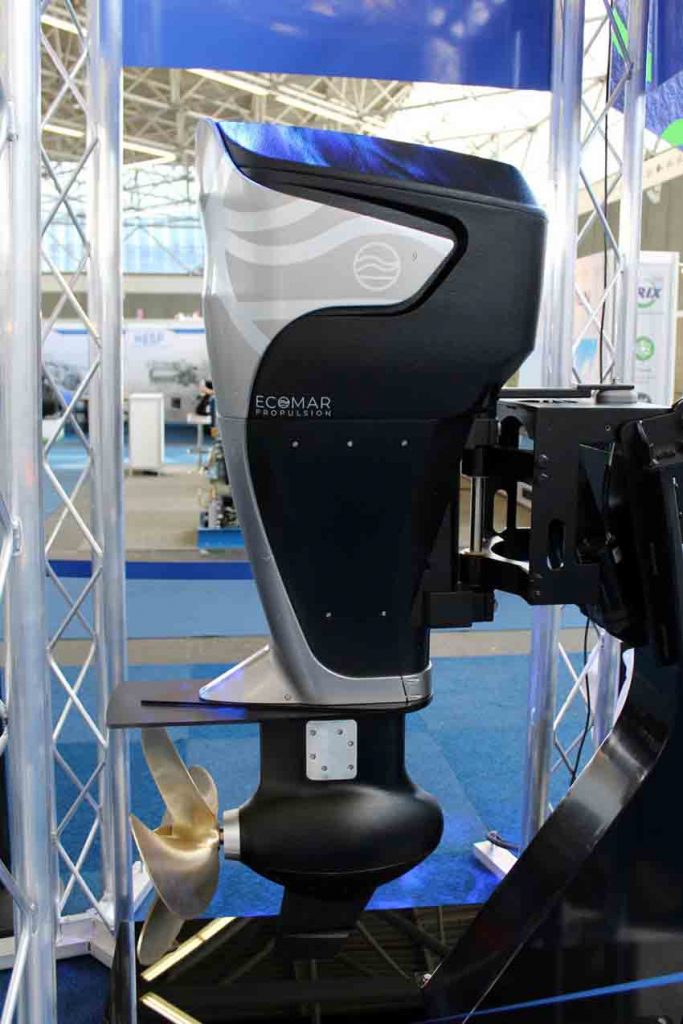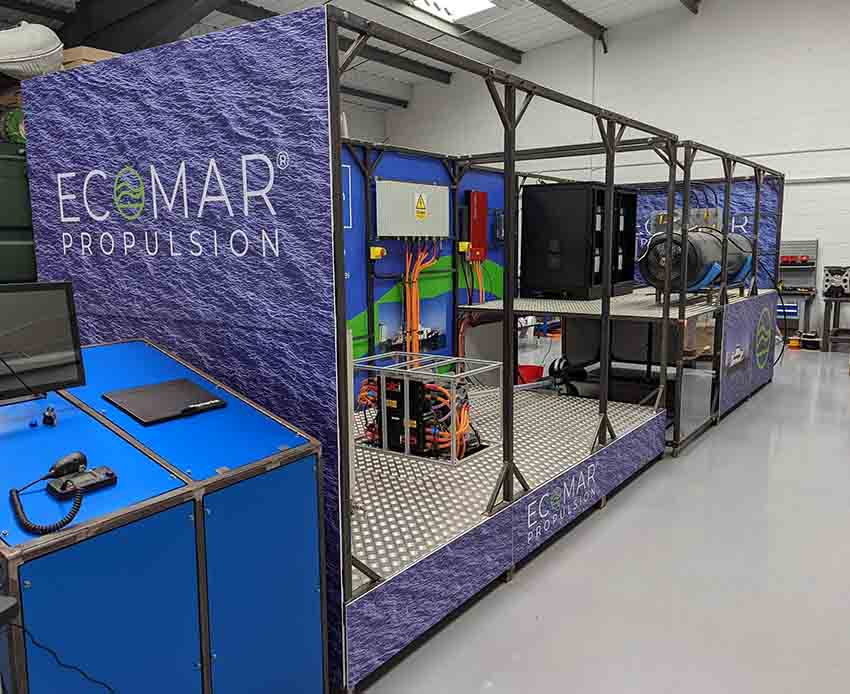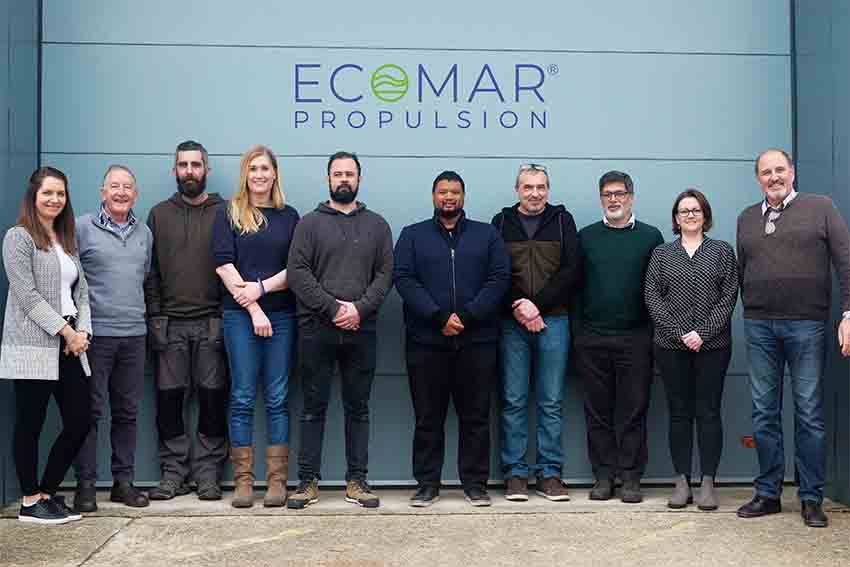Ecomar Propulsion research, design and manufacture high performance, innovative clean marine propulsion systems. With zero emission electric and hybrid hydrogen motors Ecomar Propulsion aim to reduce maritime GHGs by 10 million tonnes within 10 years.
Its products are zero emission inboard and outboard propulsion systems, with plans for larger hybrid systems. The outboards are amongst the most efficient and powerful electric green machines. Made in the UK, all products are carbon audited, 94% recyclable, high performance and tested to industry standard. They are aimed at the commercial maritime industry (responsible for 6% of the world’s CO2) to make the largest impact.
Interview with Eugene Bari, CEO of Ecomar Propulsion.
Easy Engineering: What are the main areas of activity of the company?
Eugene Bari: Ecomar Propulsion develop innovative electric and hybrid inboard and outboard marine engines and collaborate with partners to cut carbon emissions and millions of litres of fuel waste.
E.E: What’s the news about new products?
E.B: Eugene Bari, CEO said, “We will be releasing our new zero emission products throughout 2023/24. All our products are uniquely designed for commercial operations which creates a different design strategy from leisure use products.
All our designs incorporate innovative, patented features. For example, our emphasis on modular capability is designed to make replacement and repair at sea a realistic option. This makes the value proposition for owners much greater by increasing in life efficient and cost effectiveness.”
Ecomar Propulsion’s products are a minimum 94% recyclable with a full environmental audit provided. It also creates a huge benefit to operators who are increasingly required to provide accurate values on their greenhouse gas emissions. Engineering for zero emissions is no longer an aspiration, it is a commercial imperative.

Ecomar Propulsion’s Zero Emission inboard systems range from 80kW to 1MW and are aimed at efficiency and range extension, with high torque, low RPM engineering we are able to extend engine life, and reduce energy use. The innovative designs include modular service repair capability, proprietary management control systems and remote monitoring solutions. They are designed as part of an integrated system which includes batteries (and hydrogen with potentially unlimited range extension).
Ecomar Propulsion also provide consultancy for coastal and inshore vessels. We have marinised power systems in a wide range of battery sizes and chemistries and can advise customers on appropriate choices. The optional hydrogen systems include fuel cells, tanks and pipework. Even though we are a small company, we offer more than most major OEM’s.
Ecomar Propulsion products are primarily design for the workboat, CTV and offshore windfarm support sectors.
Ecomar Propulsion work alongside naval architects, builders, fleet owners and operators to provide zero emissions solutions. The team are experts in marine engineering and innovative technologies to help make the right choices from the start, saving time and resources. Ecomar Propulsion is working with international fleet owners and shipyards on radical innovative new designs for coastal freight vessels.
Ecomar Propulsion is the lead member in a number of R&D projects to rapidly electrify and de-carbonise highly polluting marine workboats.

E.E: At what stage is the market where you are currently active?
E.B: Bari said, “The market is growing exponentially with a long term growth profile that is similar to the automotive sector. However, marine has been much slower to adopt the necessary changes and we expect that the major shipping agencies will be forced to make some rapid improvements to their GHG emissions that they weren’t anticipating.”
“Globally, the EU and UK and Singapore are leading the charge to ZE shipping but the USA has just woken a sleeping giant with Bidens new IRA injection of capital. China and India may follow in the next few years and we anticipate a scramble for resources will create a new impetus for accelerated R&D and production that use fewer batteries and more alternative fuels like hydrogen and methanol. It is a really exciting time to be involved and we think it offers more opportunities for innovation on a larger scale than automotive does.”
E.E: What can you tell us about market trends?
E.B: Bari said, “A recent evaluation for the outboard sector showed an increase from almost $ zero in 2019 to over $16 billion by 2030. That shows the trajectory of demand. However, that isn’t being addressed except for small motors in leisure or massive powertrains made by companies like Wartsila. The real growth is in localized markets, short routes and most importantly in the re-evaluation away from existing modal routes. We think that the market is yet to wake up to the fact that short, frequent shipping will replace long distance outsourced megaships for most freight.”

E.E: What estimations do you have for 2023?
E.B: Eugene Bari said, “This year is a year of consolidation for many operators in marine. Shipping freight rates are back to realistic levels but the recent volatility of fuel costs and political impacts are going to make a huge difference to long term strategic planning. That has an immediate impact on predicting just how and why the marine sector will adopt new technology. From our perspective there is no alternative to shipping adopting the most energy secure, reliable and cost effective solutions as it moves from diesel and heavy fuel to clean energy solutions. That leads directly to increased investment in core technologies that are based on a multi-fuel approach rather than a single answer solution.
For us, 2023 is a year of major expansion and a real prospect of making massive progress in our ambitions. In short, its looking pretty exciting.”

